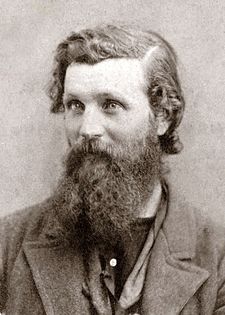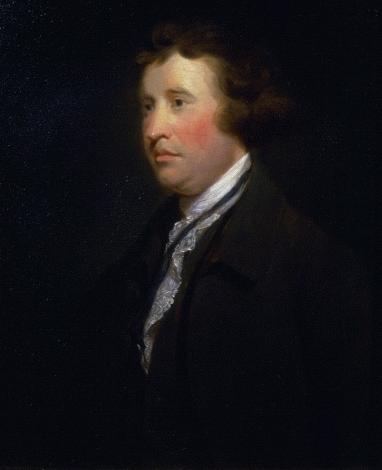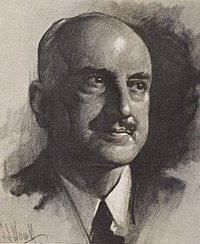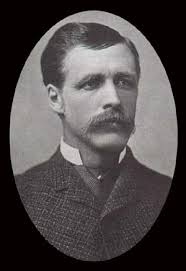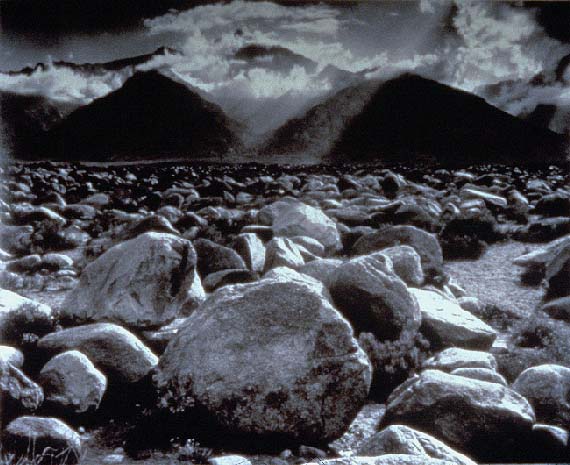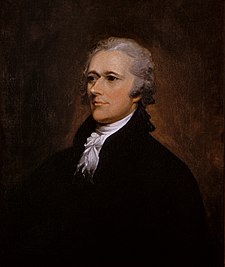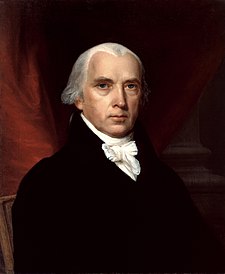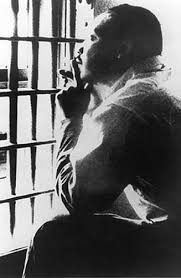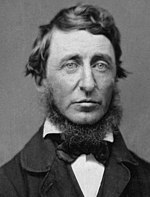CHAPTER XIII
PUBLIC ACTIVITIES AND INVESTIGATIONS
Chapter 13, from:
Twenty Years at Hull-House with Autobiographical Notes. by
Jane Addams (1860-1935). New York: The MacMillan Company, 1912 (c.1910)
ONE of the striking features of our neighborhood twenty years ago, and one to which we never became reconciled, was the presence of huge wooden garbage boxes fastened to the street pavement in which the undisturbed refuse accumulated day by day. The system of garbage collecting was inadequate throughout the city but it became the greatest menace in a ward such as ours, where the normal amount of waste was much increased by the decayed fruit and vegetables discarded by the Italian and Greek fruit peddlers, and by the residuum left over from the piles of filthy rags which were fished out of the city dumps and brought to the homes of the rag pickers for further sorting and washing.
The children of our neighborhood twenty years ago played their games in and around these huge garbage boxes. They were the first objects that the toddling child learned to climb; their bulk afforded a barricade and their contents provided missiles in all the battles of the older boys; and finally they became the seats upon which absorbed lovers held enchanted converse. We are obliged [Page 282]
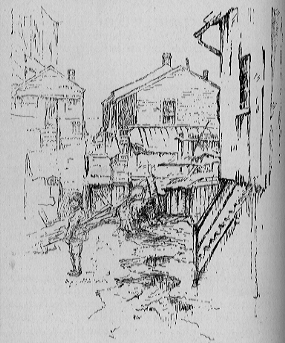
to remember that all children eat everything which they find and that odors have a curious and intimate power of entwining themselves into our tenderest memories, before even the residents
[Page 283] of Hull-House can understand their own early enthusiasm for the removal of these boxes and the establishment of a better system of refuse collection.
It is easy for even the most conscientious citizen of Chicago to forget the foul smells of the stockyards and the garbage dumps, when he is living so far from them that he is only occasionally made conscious of their existence but the residents of a Settlement are perforce constantly surrounded by them. During our first three years on Halsted Street, we had established a small incinerator at Hull-House and we had many times reported the untoward conditions of the ward to the city hall. We had also arranged many talks for the immigrants, pointing out that although a woman may sweep her own doorway in her native village and allow the reuse to innocently decay in the open air and sunshine, in a crowded city quarter, if the garbage is not properly collected and destroyed, a tenement-house mother may see her children sicken and die, and that the immigrants must therefore not only keep their own houses clean, but must also help the authorities to keep the city clean.
Possibly our efforts slightly modified the worst conditions, but they still remained intolerable, and the fourth summer the situation became for me absolutely desperate when I realized in a moment of panic that my delicate little nephew for whom [Page 284] I was guardian, could not be with me at Hull-House at all unless the sickening odors were reduced. I may well be ashamed that other delicate children who were torn from their families, not into boarding school but into eternity, had not long before driven me to effective action. Under the direction of the first man who came as a resident to Hull-House we began a systematic investigation of the city system of garbage collection, both as to its efficiency in other wards and its possible connection with the death rate in the various wards of the city.
The Hull-House Woman's Club had been organized the year before by the resident kindergartner who had first inaugurated a mother's meeting. The new members came together, however, in quite a new way that summer when we discussed with them the high death rate so persistent in our ward. After several club meetings devoted to the subject, despite the fact that the death rate rose highest in the congested foreign colonies and not in the streets in which most of the Irish American club women lived, twelve of their number undertook in connection with the residents, to carefully investigate the conditions of the alleys. During August and September the substantiated reports of violations of the law sent in from Hull-House to the health department were one thousand and thirty-seven. For the club woman who had finished a long day's work of washing or ironing [Page 285] followed by the cooking of a hot supper, it would have been much easier to sit on her doorstep during a summer evening than to go up and down ill-kept alleys and get into trouble with her neighbors over the condition of their garbage boxes. It required both civic enterprise and moral conviction to be willing to do this three evenings a week during the hottest and most uncomfortable months of the year. Nevertheless, a certain number of women persisted, as did the residents, and three city inspectors in succession were transferred from the ward because of unsatisfactory services. Still the death rate remained high and the condition seemed little improved throughout the next winter. In sheer desperation, the following spring when the city contracts were awarded for the removal of garbage, with the backing of two well-known business men, I put in a bid for the garbage removal of the nineteenth ward. My paper was thrown out on a technicality but the incident induced the mayor to appoint me the garbage inspector of the ward.
The salary was a thousand dollars a year, and the loss of that political "plum" made a great stir among the politicians. The position was no sinecure whether regarded from the point of view of getting up at six in the morning to see that the men were early at work; or of following the loaded wagons, uneasily dropping their contents at intervals, to their dreary destination at the [Page 286] dump; or of insisting that the contractor must increase the number of his wagons from nine to thirteen and from thirteen to seventeen, although he assured me that he lost money on every one and that the former inspector had let him off with seven; or of taking careless landlords into court because they would not provide the proper garbage receptacles; or of arresting the tenant who tried to make the garbage wagons carry away the contents of his stable.
With the two or three residents who nobly stood by, we set up six of those doleful incinerators which are supposed to burn garbage with the fuel collected in the alley itself. The one factory in town which could utilize old tin cans was a window weight factory, and we deluged that with ten times as many tin cans as it could use–much less would pay for. We made desperate attempts to have the dead animals removed by the contractor who was paid most liberally by the city for that purpose but who, we slowly discovered, always made the police ambulances do the work, delivering the carcasses upon freight cars for shipment to a soap factory in Indiana where they were sold for a good price although the contractor himself was the largest stockholder in the concern. Perhaps our greatest achievement was the discovery of a pavement eighteen inches under the surface in a narrow street, although after it was found we triumphantly discovered a record of its existence in [Page 287] the city archives. The Italians living on the street were much interested but displayed little astonishment, perhaps because they were accustomed to see buried cities exhumed. This pavement became the casus belli between myself and the street commissioner when I insisted that its restoration belonged to him, after I had removed the first eight inches of garbage. The matter was finally settled by the mayor himself, who permitted me to drive him to the entrance of the street in what the children called my "garbage phaëton" and who took my side of the controversy.
A graduate of the University of Wisconsin, who had done some excellent volunteer inspection in both Chicago and Pittsburg, became my deputy and performed the work in a most thoroughgoing manner for three years. During the last two she was under the régime of civil service for in 1895, to the great joy of many citizens, the Illinois legislature made that possible.
Many of the foreign-born women of the ward were much shocked by this abrupt departure into the ways of men, and it took a great deal of explanation to convey the idea even remotely that if it were a womanly task to go about in tenement houses in order to nurse the sick, it might be quite as womanly to go through the same district in order to prevent the breeding of so-called "filth diseases." While some of the women enthusiastically approved the slowly changing condi- [Page 288] tions and saw that their housewifely duties logically extended to the adjacent alleys and streets, they yet were quite certain that "it was not a lady's job." A revelation of this attitude was made one day in a conversation which the inspector heard vigorously carried on in a laundry. One of the employees was leaving and was expressing her mind concerning the place in no measured terms, summing up her contempt for it as follows: "I would rather be the girl who goes about in the alleys than to stay here any longer!"
And yet the spectacle of eight hours' work for eight hours' pay, the even-handed justice to all citizens irrespective of "pull," the dividing of responsibility between landlord and tenant, and the readiness to enforce obedience to law from both, was, perhaps, one of the most valuable demonstrations which could have been made. Such daily living on the part of the office holder is of infinitely more value than many talks on civics for, after all, we credit most easily that which we see. The careful inspection combined with other causes, brought about a great improvement in the cleanliness and comfort of the neighborhood and one happy day, when the death rate of our ward was found to have dropped from third to seventh in the list of city wards and was so reported to our Woman's Club, the applause which followed recorded the genuine sense of participation in the result, and a public spirit which had "made good." [Page 289] But the cleanliness of the ward was becoming much too popular to suit our all-powerful alderman and, although we felt fatuously secure under the régime of civil service, he found a way to circumvent us by eliminating the position altogether. He introduced an ordinance into the city council which combined the collection of refuse with the cleaning and repairing of the streets, the whole to be placed under a ward superintendent. The office of course was to be filled under civil service regulations but only men were eligible to the examination. Although this latter regulation was afterwards modified in favor of one woman, it was retained long enough to put the nineteenth ward inspector out of office.
Of course our experience in inspecting only made us more conscious of the wretched housing conditions over which we had been distressed from the first. It was during the World's Fair summer that one of the Hull-House residents in a public address upon housing reform used as an example of indifferent landlordism a large block in the neighborhood occupied by small tenements and stables unconnected with a street sewer, as was much similar property in the vicinity. In the lecture the resident spared neither a description of the property nor the name of the owner. The young man who owned the property was justly indignant at this public method of attack and promptly came to investigate the condition of the [Page 290] property. Together we made a careful tour of the houses and stables and in the face of the conditions that we found there, I could not but agree with him that supplying South Italian peasants with sanitary appliances seemed a difficult undertaking. Nevertheless he was unwilling that the block should remain in its deplorable state, and he finally cut through the dilemma with the rash proposition that he would give a free lease of the entire tract to Hull-House, accompanying the offer, however, with the warning remark, that if we should choose to use the income from the rents in sanitary improvements we should be throwing our money away.
Even when we decided that the houses were so bad that we could not undertake the task of improving them, he was game and stuck to his proposition that we should have a free lease. We finally submitted a plan that the houses should be torn down and the entire tract turned into a playground, although cautious advisers intimated that it would be very inconsistent to ask for subscriptions for the support of Hull-House when we were known to have thrown away an income of two thousand dollars a year. We, however, felt that a spectacle of inconsistency was better than one of bad landlordism and so the worst of the houses were demolished, the best three were sold and moved across the street under careful provision that they might never be used for junk- [Page 291] shops or saloons, and a public playground was finally established. Hull-House became responsible for its management for ten years, at the end of which time it was turned over to the City Playground Commission although from the first the city detailed a policeman who was responsible for its general order and who became a valued adjunct of the House.
During fifteen years this public-spirited owner of the property paid all the taxes, and when the block was finally sold he made possible the playground equipment of a near-by schoolyard. On the other hand, the dispossessed tenants, a group of whom had to be evicted by legal process before their houses could be torn down, have never ceased to mourn their former estates. Only the other day I met upon the street an old Italian harness maker, who said that he had never succeeded so well anywhere else nor found a place that "seemed so much like Italy."
Festivities of various sorts were held on this early playground, always a May day celebration with its Maypole dance and its May queen. I remember that one year that honor of being queen was offered to the little girl who should pick up the largest number of scraps of paper which littered all the streets and alleys. The children that spring had been organized into a league, and each member had been provided with a stiff piece of wire upon the sharpened point of which stray bits [Page 292] of paper were impaled and later soberly counted off into a large box in the Hull-House alley. The little Italian girl who thus won the scepter took it very gravely as the just reward of hard labor, and we were all so absorbed in the desire for clean and tidy streets that we were wholly oblivious to the incongruity of thus selecting "the queen of love and beauty."
It was at the end of the second year that we received a visit from the warden of Toynbee Hall and his wife, as they were returning to England from a journey around the world. They had lived in East London for many years, and had been identified with the public movements for its betterment. They were much shocked that, in a new country with conditions still plastic and hopeful, so little attention had been paid to experiments and methods of amelioration which had already been tried; and they looked in vain through our library for blue books and governmental reports which recorded painstaking study into the conditions of English cities.
They were the first of a long line of English visitors to express the conviction that many things in Chicago were untoward not through paucity of public spirit but through a lack of political machinery adapted to modern city life. This was not all of the situation but perhaps no casual visitor could be expected to see that these matters of detail seemed unimportant to a city in the first
[Page 293]

[Page 294] flush of youth, impatient of correction and convinced that all would be well with its future. The most obvious faults were those connected with the congested housing of the immigrant population, nine tenths of them from the country, who carried on all sorts of traditional activities in the crowded tenements. That a group of Greeks should be permitted to slaughter sheep in a basement, that Italian women should be allowed to sort over rags collected from the city dumps, not only within the city limits but in a court swarming with little children, that immigrant bakers should continue unmolested to bake bread for their neighbors in unspeakably filthy spaces under the pavement, appeared incredible to visitors accustomed to careful city regulations. I recall two visits made to the Italian quarter by John Burns–the second, thirteen years after the first. During the latter visit it seemed to him unbelievable that a certain house owned by a rich Italian should have been permitted to survive. He remembered with the greatest minuteness the positions of the houses on the court, with the exact space between the front and rear tenements, and he asked at once whether we had been able to cut a window into a dark hall as he had recommended thirteen years before. Although we were obliged to confess that the landlord would not permit the window to be cut, we were able to report that a City Homes Association had existed [Page 295] for ten years; that following a careful study of tenement conditions in Chicago, the text of which had been written by a Hull-House resident, the association had obtained the enactment of a model tenement-house code, and that their secretary had carefully watched the administration of the law for years so that its operation might not be minimized by the granting of too many exceptions in the city council. Our progress still seemed slow to Mr. Burns because in Chicago, the actual houses were quite unchanged, embodying features long since declared illegal in London. Only this year could we have reported to him, had he again come to challenge us, that the provisions of the law had at last been extended to existing houses and that a conscientious corps of inspectors under an efficient chief, were fast remedying the most glaring evils, while a band of nurses and doctors were following hard upon the "trail of the white hearse."
The mere consistent enforcement of existing laws and efforts for their advance often placed Hull-House, at least temporarily, into strained relations with its neighbors. I recall a continuous warfare against local landlords who would move wrecks of old houses as a nucleus for new ones in order to evade the provisions of the building code, and a certain Italian neighbor who was filled with bitterness because his new rear tenement was discovered to be illegal. It seemed impossible to [Page 296] make him understand that the health of the tenants was in any wise as important as his undisturbed rents.
Nevertheless many evils constantly arise in Chicago from congested housing which wiser cities forestall and prevent; the inevitable boarders crowded into a dark tenement already too small for the use of the immigrant family occupying it; the surprisingly large number of delinquent girls who have become criminally involved with their own fathers and uncles; the school children who cannot find a quiet spot in which to read or study and who perforce go into the streets each evening; the tuberculosis superinduced and fostered by the inadequate rooms and breathing spaces. One of the Hull-House residents, under the direction of a Chicago physician who stands high as an authority on tuberculosis and who devotes a large proportion of his time to our vicinity, made an investigation into housing conditions as related to tuberculosis with a result as startling as that of the "lung block" in New York.
It is these subtle evils of wretched and inadequate housing which are often the most disastrous. In the summer of 1902 during an epidemic of typhoid fever in which our ward, although containing but one thirty-sixth of the population of the city, registered one sixth of the total number of deaths, two of the Hull-House residents made an investigation of [Page 297] the methods of plumbing in the houses adjacent to conspicuous groups of fever cases. They discovered among the people who had been exposed to the infection, a widow who had lived in the ward for a number of years, in a comfortable little house of her own. Although the Italian immigrants were closing in all around her, she was not willing to sell her property and to move away until she had finished the education of her children. In the meantime she held herself quite aloof from her Italian neighbors and could never be drawn into any of the public efforts to secure a better code of tenement-house sanitation. Her two daughters were sent to an eastern college. One June when one of them had graduated and the other still had two years before she took her degree, they came to the spotless little house and their self-sacrificing mother for the summer holiday. They both fell ill with typhoid fever and one daughter died because the mother's utmost efforts could not keep the infection out of her own house. The entire disaster affords, perhaps, a fair illustration of the futility of the individual conscience which would isolate a family from the rest of the community and its interests.
The careful information collected concerning the juxtaposition of the typhoid cases to the various systems of plumbing and nonplumbing was made the basis of a bacteriological study by another resident, Dr. Alice Hamilton, as to the [Page 298] possibility of the infection having been carried by flies. Her researches were so convincing that they have been incorporated into the body of scientific data supporting that theory, but there were also practical results from the investigation. It was discovered that the wretched sanitary appliances through which alone the infection could have become so widely spread, would not have been permitted to remain, unless the city inspector had either been criminally careless or open to the arguments of favored landlords.
The agitation finally resulted in a long and stirring trial before the civil service board of half of the employees in the Sanitary Bureau, with the final discharge of eleven out of the entire force of twenty-four. The inspector in our neighborhood was a kindly old man, greatly distressed over the affair, and quite unable to understand why he should have not used his discretion as to the time when a landlord should be forced to put in modern appliances. If he was "very poor," or "just about to sell his place," or "sure that the house would be torn down to make room for a factory," why should one "inconvenience" him? The old man died soon after the trial, feeling persecuted to the very last and not in the least understanding what it was all about. We were amazed at the commercial ramifications which graft in the city hall involved and at the indignation which interference with it produced. Hull-House lost some large [Page 299] subscriptions as the result of this investigation, a loss which, if not easy to bear, was at least comprehensible. We also uncovered unexpected graft in connection with the plumbers' unions, and but for the fearless testimony of one of their members, could never have brought the trial to a successful issue.
Inevitable misunderstanding also developed in connection with the attempt on the part of Hull-House residents to prohibit the sale of cocaine to minors, which brought us into sharp conflict with many druggists. I recall an Italian druggist living on the edge of the neighborhood, who finally came with a committee of his countryman to see what Hull-House wanted of him, thoroughly convinced that no such effort could be disinterested. One dreary trial after another had been lost through the inadequacy of the existing legislation and after many attempts to secure better legal regulation of its sale, a new law with the coöperation of many agencies was finally secured in 1907. Through all this the Italian druggist, who had greatly profited by the sale of cocaine to boys, only felt outraged and abused. And yet the thought of this campaign brings before my mind with irresistible force, a young Italian boy who died,–a victim of the drug at the age of seventeen. He had been in our kindergarten as a handsome merry child, in our clubs as a vivacious boy, and then gradually there was an eclipse of [Page 300] all that was animated and joyous and promising, and when I at last saw him in his coffin, it was impossible to connect that haggard shriveled body with what I had known before.
A midwife investigation, undertaken in connection with the Chicago Medical Society, while showing the great need of further state regulation in the interest of the most ignorant mothers and helpless children, brought us into conflict with one of the most venerable of all customs. Was all this a part of the unending struggle between the old and new, or were these oppositions so unexpected and so unlooked for merely a reminder of that old bit of wisdom that "there is no guarding against interpretations"? Perhaps more subtle still, they were due to that very super-refinement of disinterestedness which will not justify itself, that it may feel superior to public opinion. Some of our investigations of course had no such untoward results, such as "An Intensive Study of Truancy" undertaken by a resident of Hull-House in connection with the compulsory education department of the Board of Education and the Visiting Nurses Association. The resident, Mrs. Britton, who, having had charge of our children's clubs for many years, knew thousands of children in the neighborhood, made a detailed study of three hundred families tracing back the habitual truancy of the child to economic and social causes. This investigation preceded a [Page 301] most interesting conference on truancy held under a committee of which I was a member from the Chicago Board of Education. It left lasting results upon the administration of the truancy law as well as the coöperation of volunteer bodies.
We continually conduct small but careful investigations at Hull-House, which may guide us in our immediate doings such as two recently undertaken by Mrs. Britton, one upon the reading of school children before new books were bought for the children's club libraries, and another on the proportion of tuberculosis among school children, before we opened a little experimental outdoor school on one of our balconies. Some of the Hull-House investigations are purely negative in result; we once made an attempt to test the fatigue of factory girls in order to determine how far overwork superinduced the tuberculosis to which such a surprising number of them were victims. The one scientific instrument it seemed possible to use was an ergograph, a complicated and expensive instrument kindly lent to us from the physiological laboratory of the University of Chicago. I remember the imposing procession we made from Hull-House to the factory full of working women, in which the proprietor allowed us to make the tests; first there was the precious instrument on a hand truck guarded by an anxious student and the young physician who was going to take the tests every afternoon; then [Page 302] there was Dr. Hamilton the resident in charge of the investigation, walking with a scientist who was interested to see that the instrument was properly installed; I followed in the rear to talk once more to the proprietor of the factory to be quite sure that he would permit the experiment to go on. The result of all this preparation, however, was to have the instrument record less fatigue at the end of the day than at the beginning, not because the girls had not worked hard and were not "dog tired" as they confessed, but because the instrument was not fitted to find it out.
For many years we have administered a branch station of the federal post office at Hull-House, which we applied for in the first instance because our neighbors lost such a large percentage of the money they sent to Europe, through the commissions to middle men. The experience in the post office constantly gave us data for urging the establishment of postal savings as we saw one perplexed immigrant after another turning away in bewilderment when he was told that the United States post office did not receive savings.
We find increasingly, however, that the best results are to be obtained in investigations as in other undertakings, by combining our researches with those of other public bodies or with the State itself. When all the Chicago Settlements found themselves distressed over the condition of the newsboys who, because they are merchants [Page 303] and not employees, do not come under the provisions of the Illinois child labor law, they united in the investigation of a thousand young newsboys, who were all interviewed on the streets during the same twenty-four hours. Their school and domestic status was easily determined later, for many of the boys lived in the immediate neighborhoods of the ten Settlements which had undertaken the investigation. The report embodying the results of the investigation recommended a city ordinance containing features from the Boston and Buffalo regulations, and although an ordinance was drawn up and a strenuous effort was made to bring it to the attention of the aldermen, none of them would introduce it into the city council without newspaper backing. We were able to agitate for it again at the annual meeting of the National Child Labor Committee which was held in Chicago in 1908, and which was of course reported in papers throughout the entire country. This meeting also demonstrated that local measures can sometimes be urged most effectively when joined to the efforts of a national body. Undoubtedly the best discussions ever held upon the operation and status of the Illinois law were those which took place then. The needs of the Illinois children were regarded in connection with the children of the nation and advanced health measures for Illinois were compared with those of other states.
The investigations of Hull-House thus tend to be [Page 304] merged with those of larger organizations, from the investigation of the social value of saloons made for the Committee of Fifty in 1896, to the one on infant mortality in relation to nationality, made for the American Academy of Science in 1909. This is also true of Hull-House activities in regard to public movements, some of which are inaugurated by the residents of other Settlements, as the Chicago School of Civics and Philanthropy, founded by the splendid efforts of Dr. Graham Taylor for many years head of Chicago Commons. All of our recent investigations into housing have been under the department of investigation of this school with which several of the Hull-House residents are identified, quite as our active measures to secure better housing conditions have been carried on with the City Homes Association and through the coöperation of one of our residents who several years ago was appointed a sanitary inspector on the city staff.
Perhaps Dr. Taylor himself offers the best possible example of the value of Settlement experience to public undertakings, in his manifold public activities of which one might instance his work at the moment upon a commission recently appointed by the governor of Illinois to report upon the best method of Industrial Insurance or Employer's Liability Acts, and his influence in securing another to study into the subject of Industrial Diseases. The actual factory investigation under [Page 305] the latter is in charge of Dr. Hamilton, of Hull-House, whose long residence in an industrial neighborhood as well as her scientific attainment, give her peculiar qualifications for the undertaking.
And so a Settlement is led along from the concrete to the abstract, as may easily be illustrated. Many years ago a tailors' union meeting at Hull-House asked our coöperation in tagging the various parts of a man's coat in such wise as to show the money paid to the people who had made it; one tag for the cutting and another for the buttonholes, another for the finishing and so on, the resulting total to be compared with the selling price of the coat itself. It quickly became evident that we had no way of computing how much of this larger balance was spent for salesmen, commercial travelers, rent and management, and the poor tagged coat was finally left hanging limply in a closet as if discouraged with the attempt. But the desire of the manual worker to know the relation of his own labor to the whole is not only legitimate but must form the basis of any intelligent action for his improvement. It was therefore with the hope of reform in the sewing trades that the Hull-House residents testified before the Federal Industrial Commission in 1900, and much later with genuine enthusiasm joined with trades-unionists and other public-spirited citizens in an industrial exhibit which made a graphic presentation of the conditions and rewards of labor. [Page 306] The large casino building in which it was held was filled every day and evening for two weeks, showing how popular such information is, if it can be presented graphically. As an illustration of this same moving from the smaller to the larger, I might instance the efforts of Miss McDowell of the University of Chicago Settlement and others in urging upon Congress the necessity for a special investigation into the conditions of women and children in industry because we had discovered the insuperable difficulties of smaller investigations, notably one undertaken for the Illinois Bureau of Labor by Mrs. Van der Vaart of Neighborhood House and by Miss Breckinridge of the University of Chicago. This investigation made clear that it was as impossible to detach the girls working in the stockyards from their sisters in industry as it was to urge special legislation on their behalf.
In the earlier years of the American Settlements, the residents were sometimes impatient with the accepted methods of charitable administration and hoped, through residence in an industrial neighborhood, to discover more coöperative and advanced methods of dealing with the problems of poverty which are so dependent upon industrial maladjustment. But during twenty years, the Settlements have seen the charitable people, through their very knowledge of the poor, constantly approach nearer to those methods formerly designated as radical. The residents, so far from holding aloof from [Page 307] organized charity, find testimony, certainly in the National Conferences, that out of the most persistent and intelligent efforts to alleviate poverty will in all probability arise the most significant suggestions for eradicating poverty. In the hearing before a congressional committee for the establishment of a Children's Bureau, residents in American Settlements joined their fellow philanthropists in urging the need of this indispensable instrument for collecting and disseminating information which would make possible concerted intelligent action on behalf of children.
Mr. Howells has said that we are all so besotted with our novel reading that we have lost the power of seeing certain aspects of life with any sense of reality because we are continually looking for the possible romance. The description might apply to the earlier years of the American settlement, but certainly the later years are filled with discoveries in actual life as romantic as they are unexpected. If I may illustrate one of these romantic discoveries from my own experience, I would cite the indications of an internationalism as sturdy and virile as it is unprecedented which I have seen in our cosmopolitan neighborhood: when a South Italian Catholic is forced by the very exigencies of the situation to make friends with an Austrian Jew representing another nationality and another religion, both of which cut into all his most cherished prejudices, he finds it harder to utilize them a [Page 308] second time and gradually loses them. He thus modifies his provincialism, for if an old enemy working by his side has turned into a friend, almost anything may happen. When, therefore, I became identified with the peace movement both in its International and National Conventions, I hoped that this internationalism engendered in the immigrant quarters of American cities might be recognized as an effective instrument in the cause of peace. I first set it forth with some misgiving before the Convention held in Boston in 1904 and it is always a pleasure to recall the hearty assent given to it by Professor William James.
I have always objected to the phrase "sociological laboratory" applied to us, because Settlements should be something much more human and spontaneous than such a phrase connotes, and yet it is inevitable that the residents should know their own neighborhoods more thoroughly than any other, and that their experiences there should affect their convictions.
Years ago I was much entertained by a story told at the Chicago Woman's Club by one of its ablest members in the discussion following a paper of mine on "The Outgrowths of Toynbee Hall." She said that when she was a little girl playing in her mother's garden, she one day discovered a small toad who seemed to her very forlorn and lonely, although she did not in the least know how to comfort him, she reluctantly left him to [Page 309] his fate; later in the day, quite at the other end of the garden, she found a large toad, also apparently without family and friends. With a heart full of tender sympathy, she took a stick and by exercising infinite patience and some skill, she finally pushed the little toad through the entire length of the garden into the company of the big toad, when, to her inexpressible horror and surprise, the big toad opened his mouth and swallowed the little one. The moral of the tale was clear applied to people who lived "where they did not naturally belong," although I protested that was exactly what we wanted–to be swallowed and digested, to disappear into the bulk of the people.
Twenty years later I am willing to testify that something of the sort does take place after years of identification with an industrial community.
 Benjamin Franklin at his death was probably the most well known person in the world, more widely known than even Voltair. His curiosity took him from the longhouses of the Iroquois Confederacy - where he learned about a freedom loving system of government that captured his imagination and some suggest played a role in his contributions to the Constitutional Convention in 1787; to the palaces of England and France where he served as a diplomat on behalf of the young American nation.
Benjamin Franklin at his death was probably the most well known person in the world, more widely known than even Voltair. His curiosity took him from the longhouses of the Iroquois Confederacy - where he learned about a freedom loving system of government that captured his imagination and some suggest played a role in his contributions to the Constitutional Convention in 1787; to the palaces of England and France where he served as a diplomat on behalf of the young American nation.
